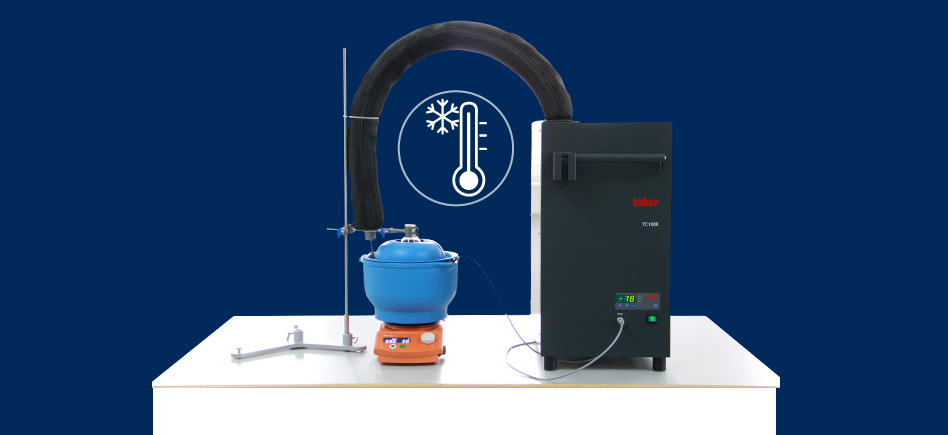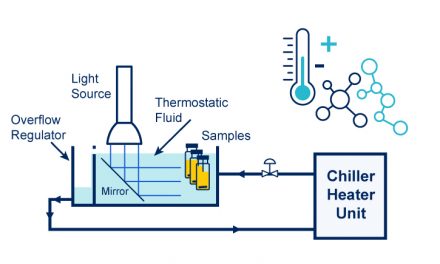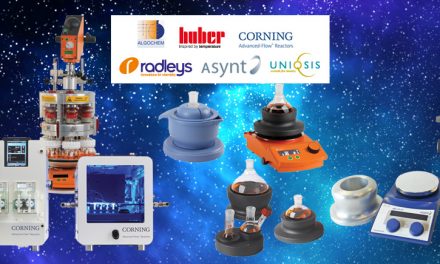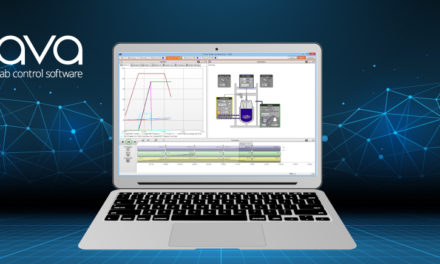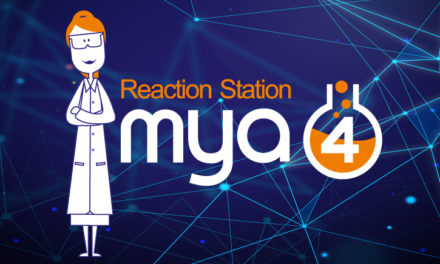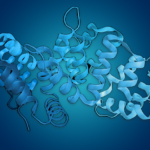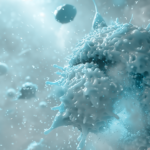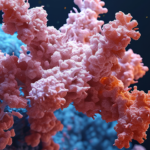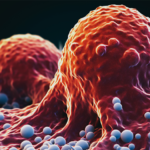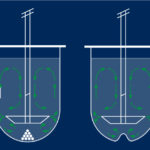Some chemical syntheses must be done at low temperatures over long periods of time.
To have the possibilities to do that, several solutions can be considered, like the use of:
A mixture of ice – salt:
Minimum temperatures of a ice-salt mixtures:
- T ~ 0°C: ice bath.
- T ~ -10°C: ice bath (70 %) + calcium chloride (30 %).
- T ~ – 15 °C: ice bath (80 %) + amonnium chloride (20 %).
- T ~ – 20°C: ice bath (75 %) + sodium chloride (25 %).
Percentages are given in mass.
An organic solvent mixture – dry ice:
Mixtures can be obtained bya mixing of dry ice and organic solvents.
- T ~ – 23°C: carbon tetrachloride / dry ice.
- T ~ – 60°C: chloroform / dry ice.
- T ~ – 78°C: acetone/ dry ice.
- T ~ – 95°C: toluene/ dry ice.
- T ~ – 100°C : ether/ dry ice.
The air or a liquid nitrogen or an organic solvent / liquid nitrogen:
- T ~ – 170 – 180°C
Precautions to be taken and constraints encountered:
For each solution, some cautions should also be considered to maintain low temperatures, such as:
- Add a thermal insulation of the synthesis system by covering it with an insulating material.
- Use of a glass Dewar or Cool-It.
Despite these solutions and cautions, the stability of the temperature of the reaction medium will not be guaranteed and becomes very annoying for the synthesis of boronic acids.
Boronic acids can be done creating a magnesium or a lithian and then add it on a boric acid ester (Scheme 1) and then hydrolyze the arylboronic ester obtained and then recover the boronic acid.
 Boronic acids done from the organolithians have the advantage of preparing the aryllithians by ortholithization, freeing themselves from the halogenated precursor. It has also been shown that in some cases the unstable organolithien can be trapped in situ by adding the lithic base to a mixture of arene and borate (Scheme 2).
Boronic acids done from the organolithians have the advantage of preparing the aryllithians by ortholithization, freeing themselves from the halogenated precursor. It has also been shown that in some cases the unstable organolithien can be trapped in situ by adding the lithic base to a mixture of arene and borate (Scheme 2).
Limitations for the ortholithiation is that this synthesis must be done at very low temperatures (from -78°C to -40°C) with often, limited existing synthesis tools with which the need for monitoring the temperature due to frequent recharge of carboglace/solvent or liquid nitrogen/solvent, by the users, can quickly become cumbersome and time-consuming.
Push the limits with efficients solutions:
In order to push these limitations Interchim can support you offering effective and appropriate systems for specific applications.
For example, for applications where the stability of the temperature and an efficient stirring are required over long period time Interchim recommands:
For synthesis done in 10ml up to 2L round bottom flasks:
• The use of the Cool-It bowl from Radleys and the immersion cooler TC100E from Huber.
 |
The unbreakable HDPE Cool-it insulated bowls fit onto standard stirring hotplate for round bottom flasks. |
 |
The immersion cooler TC100E allows a quick and a controlled cooling of the liquid inside the Cool-It bowl and to garantee a constant temperature (T°C max: -100°C) with an accuracy of +/- 0.5k. |
| The combination of these two systems ensures the stability of temperature of the reaction medium and an effective stirring over an unlimited reaction time. |
|
For synthesis done with parallel reactions stations:
• The use of the Cooled Carousel Reservoirs from Radleys and the immersion cooler TC100E from Huber.
 |
The unbreakable HDPE Cooled Carousel Reservoirs fit onto standard stirring hotplate and can be used with 6 or 12 or 24 parallel reaction stations. |
 |
The immersion cooler TC100E allows a quick and a controlled cooling of the liquid inside the Cooled Carousel Reservoirs and to garantee a constant temperature (T°C max: -100°C) with an accuracy of +/- 0.5k. |
| The combination of these two systems ensures the stability of temperature of the medium and an effective stirring over an unlimited reaction time. |
|
For more information:
In all of this, to help you push back the limits of your syntheses because of the existing tools, contact Interchim®.
Thanks to our big network of suppliers everywhere in the world, Interchim will be always able to find the best solution with innovative productivity tools to answer exactly to the needs requested by your applications.
 |
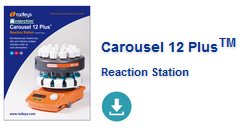 |
 |
More information |
More information |
More information |
Feel free to contact the technical support at +33 4 70 03 73 01 or by email at interfine@interchim.com.

